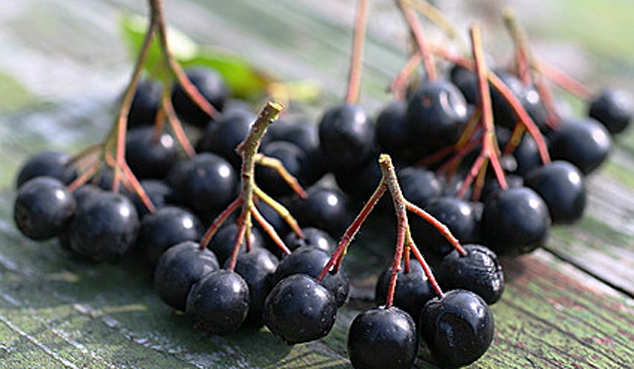Black (black) and red rowan - distant relatives. Both plants belong to a common family, but different genera. Red - to the genus Rowan (Sorbus), black-fruited - to the genus Aronia (Aronia).
The black chokeberry is called the rowan owing only to the external similarity of inflorescences and stems: succulent false drupes, gathered in a brush. Another unifying feature is the benefits and healing properties of the fruit.
Further in the article we will consider the beneficial properties of the black chokeberry, learn about the health hazards and the medicinal properties of the berries.
Table of contents
Aronia Aronia
Cultural aronia, widespread in Russian gardens, is the brainchild of Ivan Vladimirovich Michurin. Her ancestor is a wild North American shrub (Aronia Aronia) with poor edible fruits, which is considered to be a malicious weed in its homeland. Having received its seeds, the Russian breeder began lengthy experiments on the hybridization of the “American”.
According to various sources, the crossing took place either along the Aronia black choke line - Aronia is lybivolistnaja, or along the Aroniya black choke line - Common Rowan. As a result, a new plant appeared with tart, slightly dry fruits, which are called “apples” in fruit growing. In honor of its creator, it received the name of Aronia Michurin.
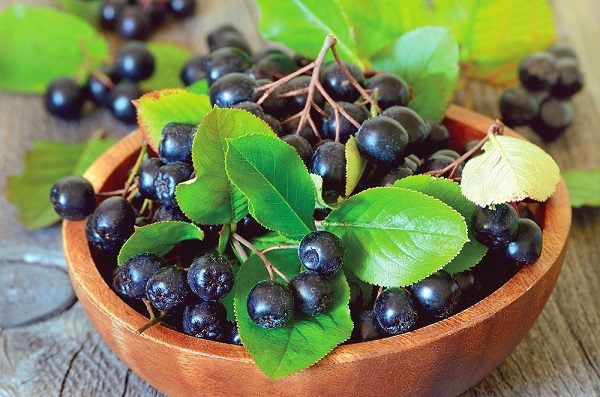
The composition of Aronia
Let's start with the question, what is useful for black chokeberry? The dark purple, almost black color of the fruits of chokeberry speaks for itself: they have a lot of anthocyanins. These substances in the plant not only play the role of a pigment, but also protect tissues from oxidative stress.How is this important for a person? The fact that anthocyanins are those notorious antioxidants that are included in the lexicon of cosmetologists and pharmacists. They neutralize oxygen free radicals that can cause cellular mutations.
The astringent taste of black insects is a merit of tannins. These are the so-called "tannins", which bind carcinogens and reduce the risk of the formation of tumors.
The fruits of chokeberry, despite the sweetness, are quite low-calorie - only 55kcal per 100 g. The vitamin-mineral composition is rich:
| Substances | Content per 100 g of product |
| Vitamins:
vitamin C vitamin A vitamin b1 vitamin b2 vitamin b6 vitamin b9 vitamin E vitamin PP beta carotene |
15 mg 200 mcg 0.01 mg 0.02 mg 0.06 mg 1.7 mcg 1.5 mg 0.6 mg 1.2 mg |
| Minerals:
potassium calcium magnesium phosphorus sodium iron |
158 mg 28 mg 14 mg 55 mg 4 mg 1.1 mg |
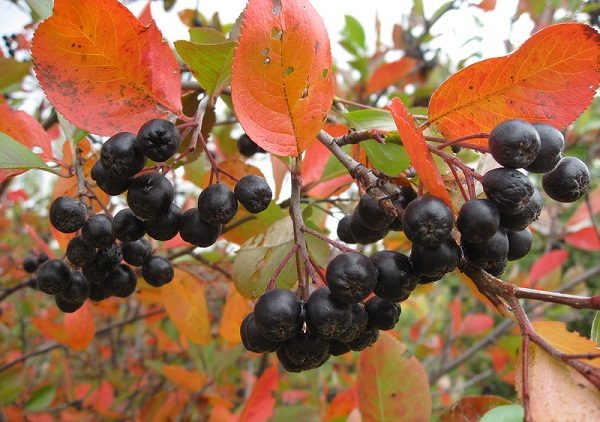
Black Rowan Cure
And now we will consider the healing properties of blackfruits. The fruits of chokeberry have long been adopted as a medicinal raw material. Special attention should be paid to people with cardiovascular problems and diabetics. If you eat only 100 grams of black apples daily, you can quickly adjust your cholesterol and blood sugar levels. The use of these fruits for medicinal purposes is indicated for many diseases:
- Hypertension. Aronia has a diuretic effect, due to which the blood volume decreases, and the pressure decreases.
- Atherosclerosis. Flavonoids and vitamins C, E and A strengthen the walls of blood vessels.
- Reduced immunity and inflammatory processes. Aronia anthocyanins can also help with infectious diseases of bacterial etiology.
- Hypoacid gastritis. The fruits of chokeberry increase the acidity of gastric juice.
- Sleep disturbancenervousness. Aurus reduces excitability by acting as a natural sedative.
- Toxicosis pregnant. The hepatoprotective effect of chokeberry fruit helps to cope with nausea.
- Diarrhea. Tannins have astringent action, normalizing digestion.
- Visual impairment. Vitamin A, which is part of the visual purpura, normalizes many processes. Especially useful for the black eye "senile eyes", reducing the risk of glaucoma and cataracts.
- Fruits of chokeberry Recommended to people affected by radiation or living in areas with poor ecology. In this case, you need to ensure that the fruits used are grown in safe regions.
The use of chokeberry is obvious, but we should not forget about the precautionary measures. People with thrombosis, ulcerative processes of the stomach and intestines, with colitis, constipation, hyperacid gastritis and hypotension should be consumed with caution.
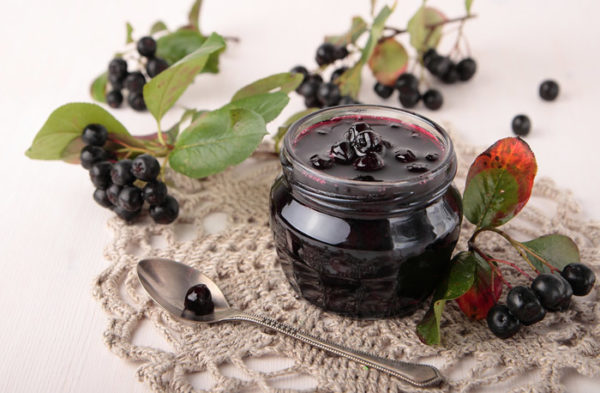
Red rowan
Red rowan is a familiar element of Russian phytocenoses. It occurs everywhere, includes many species and two life forms: shrub and woody. But on her personal sites, she was almost never planted on her. And in vain.
First, the mountain ash perfectly gives in to formation and can become an interesting accent in decorative plantings.Secondly, its fruits are no less useful than the widely used fruits of chokeberry.
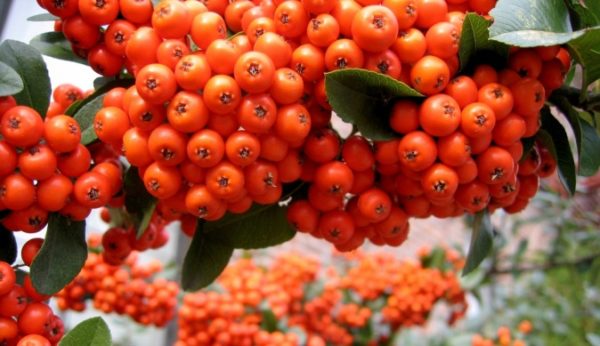
The composition of the fruits of red berries and benefits to the body
The fruits of the red rowan are bitter and that is good. Parasorbic acid, a substance with a very high antimicrobial activity, gives them bitterness. Back in the middle of the 20th century, Mikhail Mikhailovich Shemyakin, a legendary biochemist and scientist, conducted experiments with mice infected with salmonella. After the administration of 1 mg of diluted para-orbic acid into the peritoneum, the experimental animals recovered.
Other valuable substances found in rowan "apples" are flavonoids that can increase the body's resistance to radiation, and pectins. Gelling properties of the latter are used not only in cooking, but also in medicine - to bind and remove toxins.
Calorie fruits of mountain ash - 50 kcal per 100 g As a multivitamin raw materials, they are invaluable. Rowan - record among other plants in many respects.
| Substances | Content per 100 g of product |
| Vitamins:
vitamin C vitamin A vitamin b1 vitamin b2 vitamin b9 vitamin E vitamin PP beta carotene |
70 mg 1500 mcg 0.05 mg 0.02 mg 0.2 mcg 1.4 mg 0.5 mg 9 mg |
| Minerals:
potassium calcium magnesium phosphorus sodium iron manganese copper zinc |
230 mg 2 mg 331 mg 17 mg 10 mg 2 mg 2 mg 120 mcg 0.3 mg |
The chemical composition of the fruits of red rowan clearly shows that the content of carotene and vitamin A, this plant will give odds to carrots. Rowan juice contains the greatest amount of vitamin C among all fruit juices.
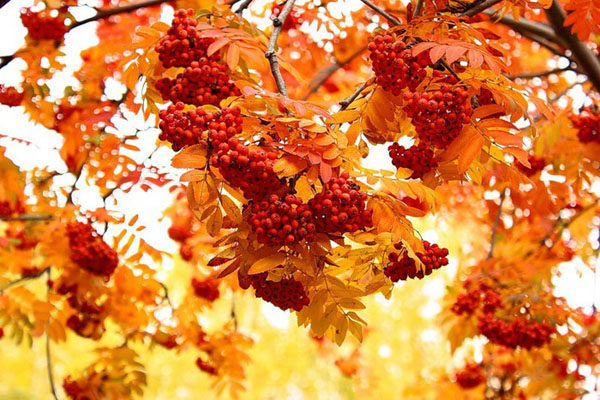
Medicinal properties and contraindications of red rowan
Now consider what diseases rowan treats. In the old medical books you can find a lot of recipes for the treatment of the fruits of red rowan. Since ancient times, they were considered a panacea for dysentery, scurvy and hemorrhoids, used as a disinfectant, diuretic, laxative, choleretic and anti-inflammatory agent. WITHModern research confirms the findings of traditional medicine. Today, red rowan (dried and fresh) is used in cases where:
- requires rapid strengthening of immunity in viral or other infections;
- you need an anti-inflammatory medication in addition to medication for angina,bronchitis, laryngitis, tracheitis, pharyngitis, otitis, and so on;
- vascular walls need to be strengthened;
- you need a remedy for anemia;
- it is necessary to stimulate the appetite and increase the tone of the intestine;
- A natural wound healing or antimycotic agent is required.
Contraindications to the use of red rowan fruits are hypotension, thrombosis, hyperacid gastritis, gastrointestinal ulcers, diarrhea, ischemia, heart attack, pregnancy and early childhood.
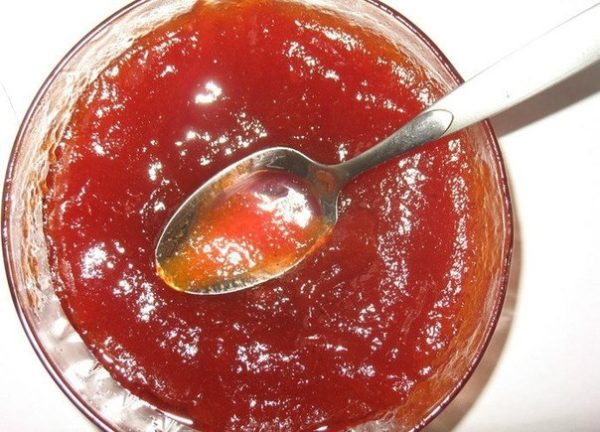
Harvesting and storage of the fruits of mountain ash
Fruits of chokeberry are harvested from mid-September until frost. It is better not to delay too much with the collection, because these berries are readily pecked by birds and fall off when overripe. Gather them, cutting off the fruitpot from a branch entirely, and then pick berries in dishes. Then washed and sent for drying.
Red mountain ash is best collected at the end of October or in November, when it is slightly touched by cold. Such fruits are not stored, but they are guaranteed not to be toxic. After collection, they should immediately be recycled.For example, you can make rowan juice with pulp for the winter.
